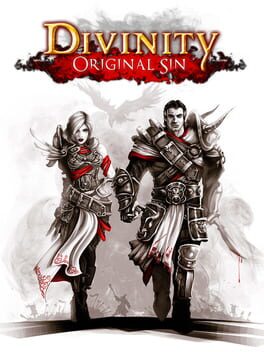I'd played about up to the halfway point years ago with a housemate, but unfortunately we couldn't finish it before moving out. Since then I've played the sequel, which is honestly just a masterpiece, so I'd been interested to return to this one to finish the job for a while.
Playing Divinity: Original Sin in a post-Original Sin II (and post-Baldur's Gate III) world, it is best summarised as a deeply flawed blueprint for the style of RPG Larian would go on to develop two all-timers upon (going off reputation for BG3, I haven't played it yet). It's conceptually brilliant; an old-school RPG with tactical turn-based combat that uses the Elder Scrolls concept of every item being a physical object, then actually USES that concept to enhance both the role-playing and combat. This allows such a range of interaction with the game-world and theoretically opens up many ways to progress through the environment and complete quests.
Here in its inception, that range hadn't quite been accounted for, with characters often not responding in ways that quite made sense for my actions. There's a jankiness to the way everything works here, which means that often the most engaging way to utilise the brilliant interactivity on display is to cheese and exploit the fuck out of everything. In this respect it's got an Oblivion quality to it, where I'm not quite enjoying the game in the way I believe was intended, but because the developers were bold enough to not put checks and balances on their ambitious systems I still feel like I owe it to them for my enjoyment.
There are other issues: because a single resource must be invested in combat, stealth, and civil skills, the fact that combat is the only true progression-blocker strongly incentivises investment in combat skills to the exclusion of others, whereas the sequel did well to separate them and thus allowing combat, civil, and stealth specialisations to develop separately. The writing here is often fine but fails to treat its world with integrity, deliberately delving into goofy territory on the regular, a far cry from the sequel's balance of silly fantasy humour and well-rounded characters with strong personalities and emotionally resonant arcs.
Though comparisons are negative, the truth is that the formula Larian struck here is so fantastic that even this relatively weak iteration is still a banger of a game. I mostly had a fantastic time playing it, and would handily recommend it to anyone looking for a bright, fun RPG that can get a little wacky.
Playing Divinity: Original Sin in a post-Original Sin II (and post-Baldur's Gate III) world, it is best summarised as a deeply flawed blueprint for the style of RPG Larian would go on to develop two all-timers upon (going off reputation for BG3, I haven't played it yet). It's conceptually brilliant; an old-school RPG with tactical turn-based combat that uses the Elder Scrolls concept of every item being a physical object, then actually USES that concept to enhance both the role-playing and combat. This allows such a range of interaction with the game-world and theoretically opens up many ways to progress through the environment and complete quests.
Here in its inception, that range hadn't quite been accounted for, with characters often not responding in ways that quite made sense for my actions. There's a jankiness to the way everything works here, which means that often the most engaging way to utilise the brilliant interactivity on display is to cheese and exploit the fuck out of everything. In this respect it's got an Oblivion quality to it, where I'm not quite enjoying the game in the way I believe was intended, but because the developers were bold enough to not put checks and balances on their ambitious systems I still feel like I owe it to them for my enjoyment.
There are other issues: because a single resource must be invested in combat, stealth, and civil skills, the fact that combat is the only true progression-blocker strongly incentivises investment in combat skills to the exclusion of others, whereas the sequel did well to separate them and thus allowing combat, civil, and stealth specialisations to develop separately. The writing here is often fine but fails to treat its world with integrity, deliberately delving into goofy territory on the regular, a far cry from the sequel's balance of silly fantasy humour and well-rounded characters with strong personalities and emotionally resonant arcs.
Though comparisons are negative, the truth is that the formula Larian struck here is so fantastic that even this relatively weak iteration is still a banger of a game. I mostly had a fantastic time playing it, and would handily recommend it to anyone looking for a bright, fun RPG that can get a little wacky.
